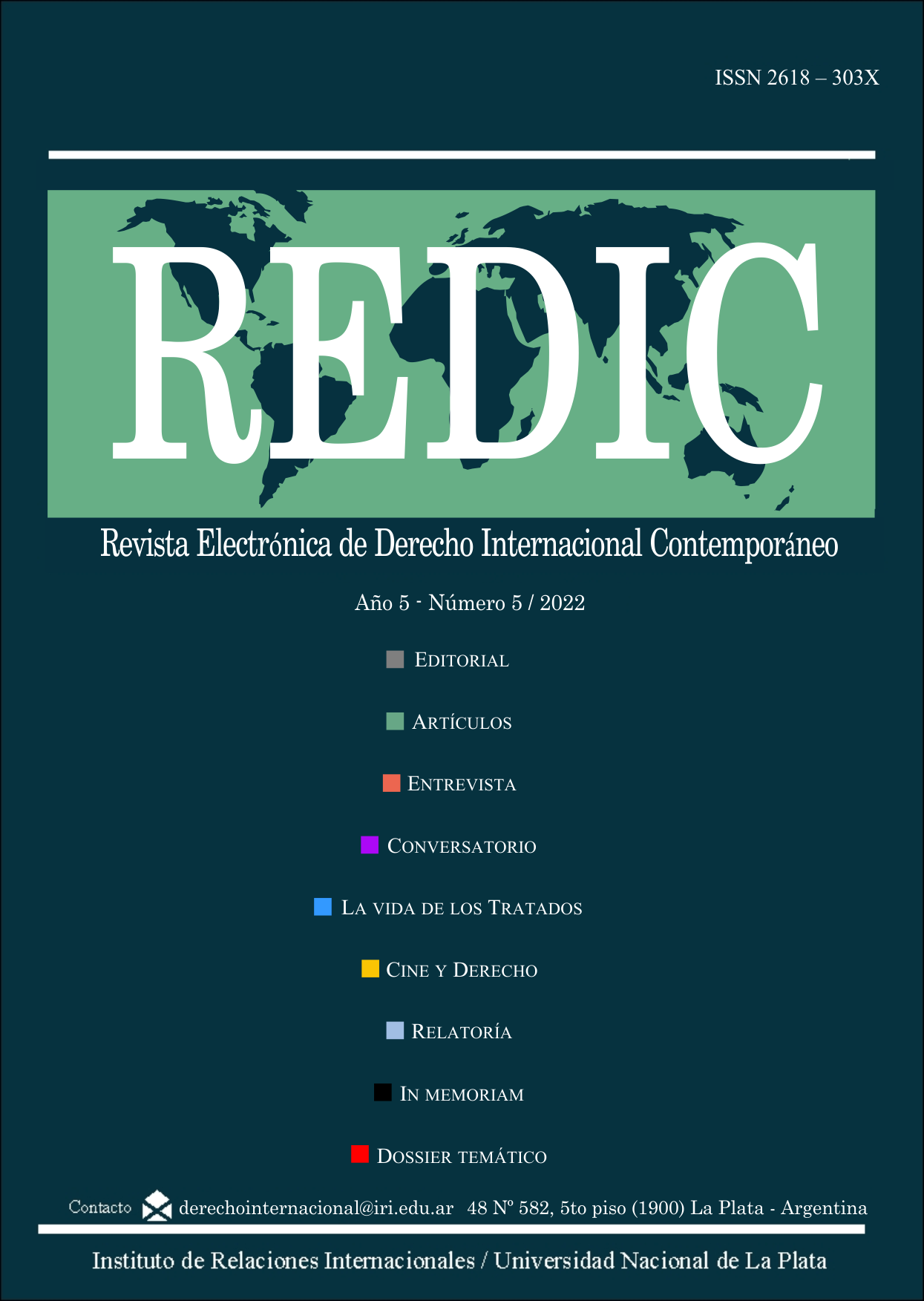Refugees and internally displaced persons facing sexual exploitation and United Nations peacekeeping missions
DOI:
https://doi.org/10.24215/2618303Xe044Keywords:
sexual violence, peacekeeper, refugees, internally displaced personsAbstract
This article will be based on reports from international organizations, newspaper clippings, and reports that have recorded over the years sexual violence perpetrated by those who should provide security and protection to IDP's and refugees. We propose, for this dossier, to problematize about the weak or absent justiciability and reproach by the international community with reference to crimes of a sexual nature committed by contingents of peace missions.
Downloads
References
Bastick, M., Grimm, K. y Kunz, R. (2007). Sexual violence in armed conflict. Global Overview and Implications for the Security Sector. Geneva Centre for the Democratic Control of Armed Forces.
Donnelly, P. Mazurana, D. y Papworth, E. (2022). Azul contra azul: investigando el abuso sexual entre el personal de mantenimiento de la paz. International Peace Institute.
France 24. (2021, 15 de septiembre). Cascos azules de Gabón abandonan República Centroafricana tras denuncias de abusos sexuales. https://www.france24.com/es/%C3%A1frica/20210915-retirada-gabon-abusos-sexuales-republica-centroafricana
Naciones Unidas. (2003). Boletín del Secretario General Medidas especiales de protección contra la explotación y el abuso sexuales. ST/SGB/2003/13.
UN News. (2006, 13 de octubre). Annan mejora aún más la "tolerancia cero" del abuso sexual por parte de las fuerzas de paz de la ONU. UN News Global perspective Human stories. https://news.un.org/en/story/2006/10/196122
UN News. (2001, 31 de agosto). East Timor: UN looks into allegations of sexual misconduct by peacekeepers. UN News Global perspective Human stories. https://news.un.org/en/story/2001/08/5572-east-timor-un-looks-allegations-sexual-misconduct-peacekeepers
UNFPA. (2017, 20 de octubre). Sexual-violence devastating, humanitarian needs mounting Rohingya crisis. News. https://www.unfpa.org/news/sexual-violence-devastating-humanitarian-needs-mounting-rohingya-crisis
UNHCR y Save the Children. (2002). Sexual violence and exploitation the experience of refugee children in Guinea, Liberia and Sierra Leone. UNHCR and Save the Children. https://www.alnap.org/help-library/sexual-violence-and-exploitation-the-experience-of-refugee-children-in-guinea-liberia
Vahedi, L., Bartels, S. y Lee, S. (2020). His Future will not be Bright: A qualitative analysis of mothers’ lived experiences raising peacekeeper-fathered children in Haiti. Children and Youth Services Review, 119. https://doi.org/10.1016/j.childyouth.2020.105625
Wagner, K. (2022). Sexual exploitation by UN peacekeepers in DRC: fatherless children speak for first time about the pain of being abandoned. The Conversation. https://theconversation.com/sexual-exploitation-by-un-peacekeepers-in-drc-fatherless-children-speak-for-first-time-about-the-pain-of-being-abandoned-188248#:~:text=As%20of%20August%204%202022,children%2C%20dating%20back%20to%202007
Additional Files
Published
How to Cite
Issue
Section
License
Copyright (c) 2022 Mayra A. Scaramutti

This work is licensed under a Creative Commons Attribution-NonCommercial-ShareAlike 4.0 International License.
Aquellos autores/as que tengan publicaciones con esta revista, aceptan los términos siguientes:
- Los autores/as conservarán sus derechos de autor y garantizarán a la revista el derecho de primera publicación de su obra, el cuál estará simultáneamente sujeto a la Licencia de reconocimiento de Creative Commons (BY-NC-SA) 4.0 que permite a terceros compartir la obra siempre que se indique su autor y su primera publicación esta revista, no se haga uso comercial, y si se remezcla, se transforma o se crea a partir del material, se debe distribuir bajo la misma licencia del original.
- Los autores/as podrán adoptar otros acuerdos de licencia no exclusiva de distribución de la versión de la obra publicada (p. ej.: depositarla en un archivo telemático institucional o publicarla en un volumen monográfico) siempre que se indique la publicación inicial en esta revista.
- Se permite y recomienda a los autores/as difundir su obra a través de Internet (p. ej.: en archivos telemáticos institucionales o en su página web) antes y durante el proceso de envío, lo cual puede producir intercambios interesantes y aumentar las citas de la obra publicada. (Véase El efecto del acceso abierto).





















